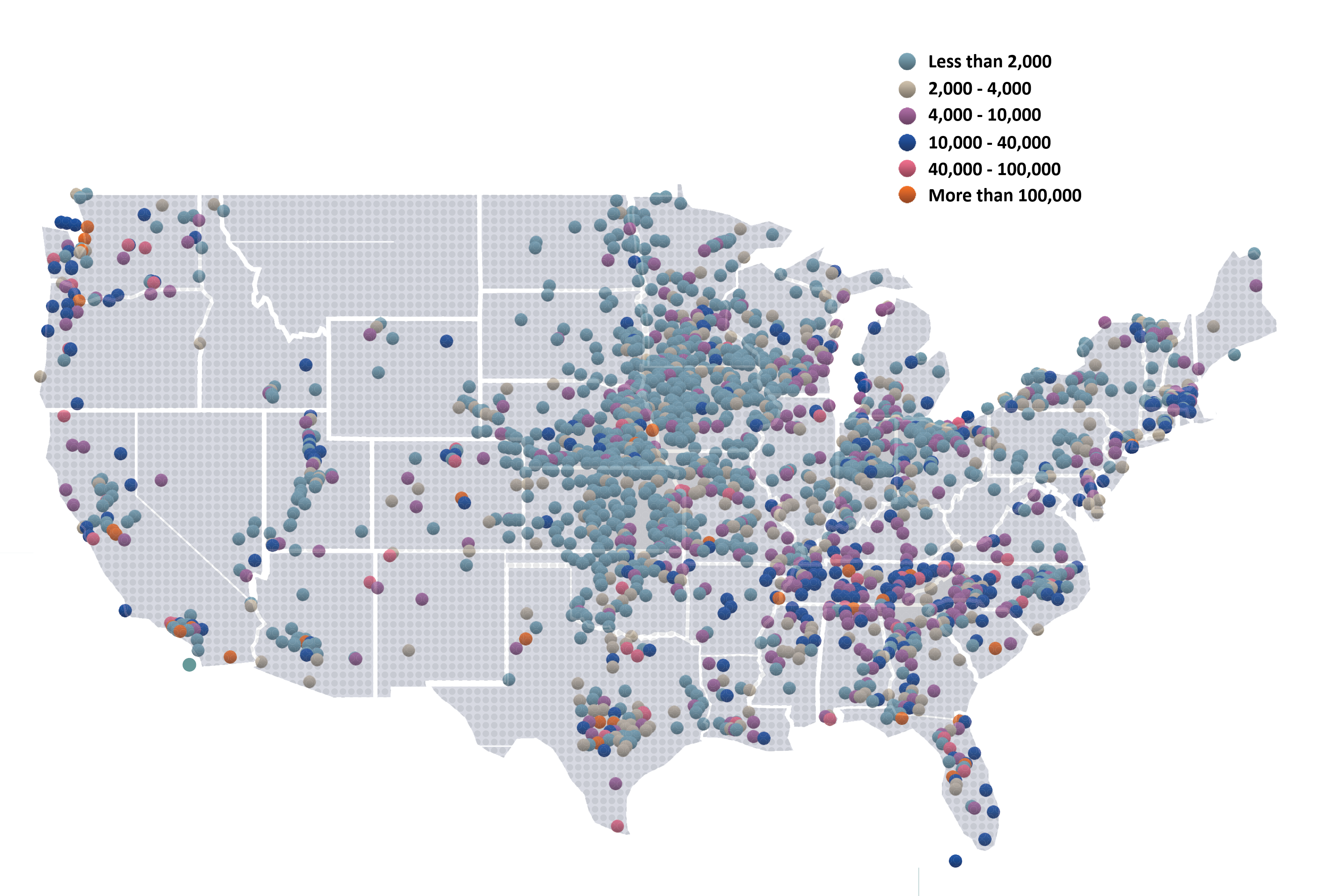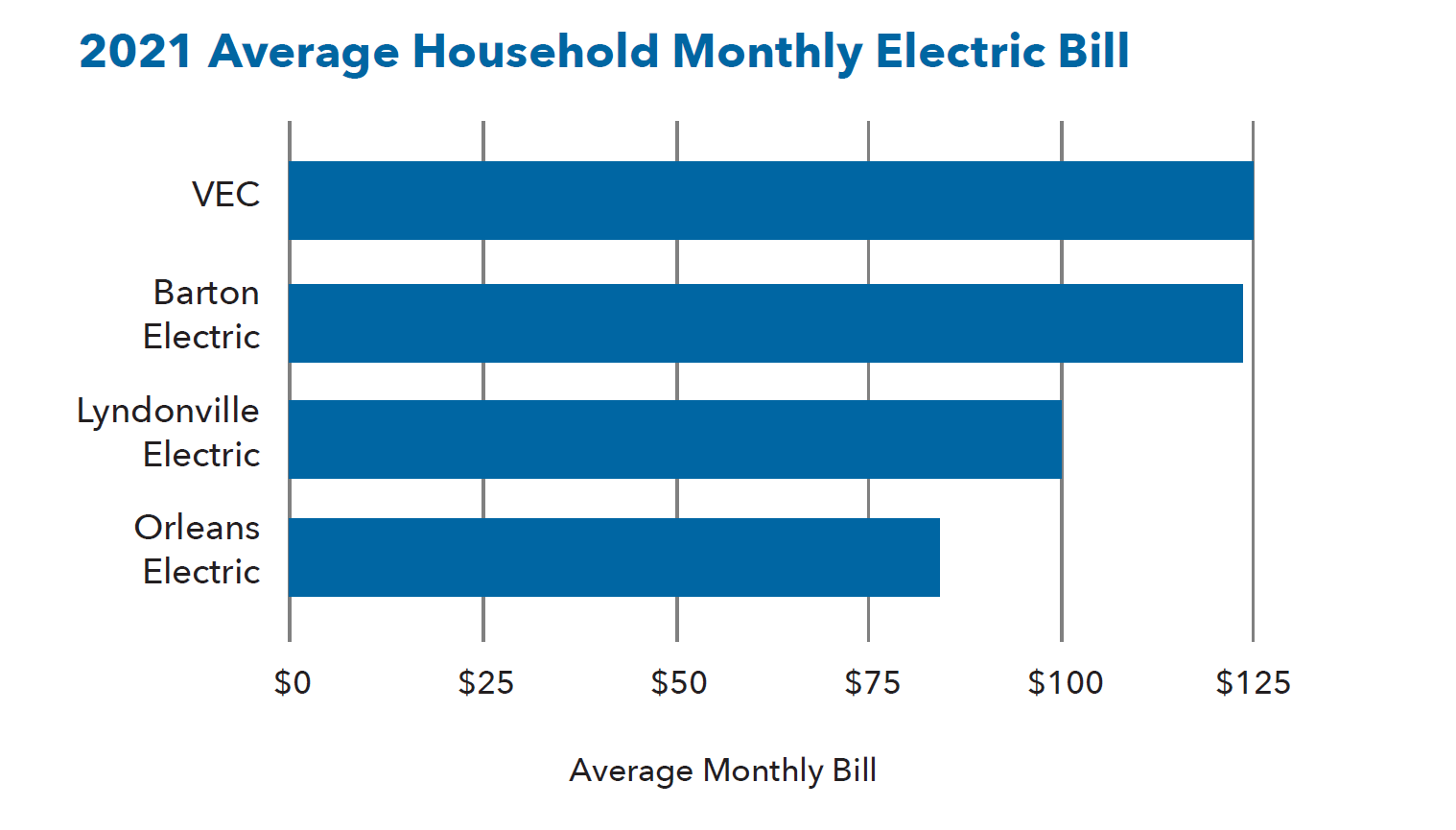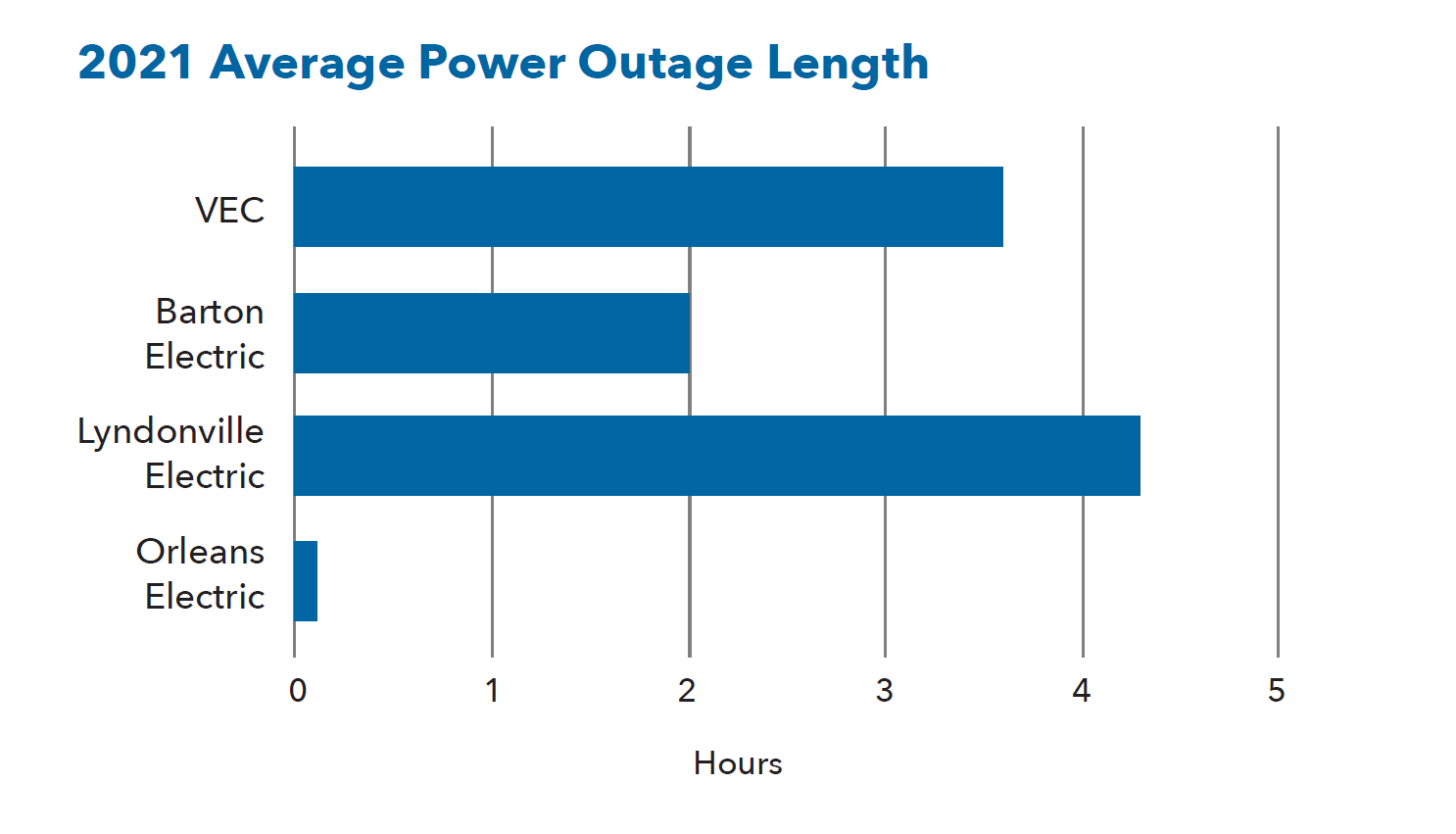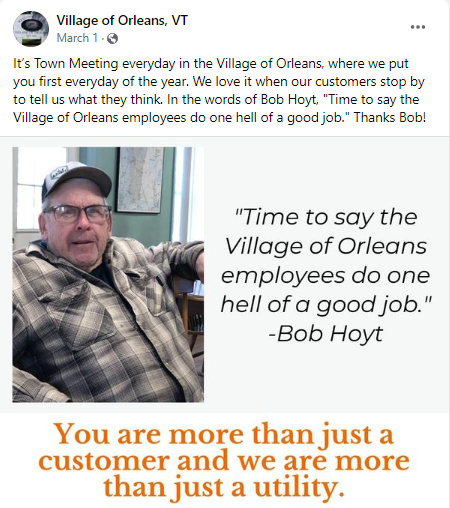Barton Electric Vote
What does the proposed sale of Barton Electric mean for you?
This is a decision that can't be taken lightly or made quickly.

Barton Electric has been owned and operated by the village for 128 years.
A ballot vote will determine if Barton Electric is sold to Vermont Electric Cooperative (VEC). The decision is in the hands of Barton Village voters.
Barton Village residents can vote on May 10, 2022. Polls will be open from 10:00am - 7:00pm at the Memorial Hall located downstairs of the theater.
May 4, 2022
I was disheartened to learn that at their last Trustee meeting the Barton Village Trustees expressed frustration with VPPSA’s efforts to educate Barton residents. Our staff works hard every day to support Barton and has done so since the village first became a VPPSA member.
It is important for you to know that VPPSA was founded over 40 years ago specifically to assist and advocate for community-owned electric utilities. We have an obligation to provide accurate information to our member communities. When the Trustees decided to hold sale negotiations with only VEC, without our assistance, it put us in an awkward position. We had to decide whether to stay silent about the incorrect assumptions and misinterpretations that the Barton Trustees are sharing as “facts.” We made the uncomfortable, but ethically necessary decision to make sure that Barton Electric customers understand the impact of the vote on May 10th.
Unfortunately, recent information being put forward requires additional clarifications.
Barton Trustees have acknowledged that they began discussions with VEC two years before seeking bids from other utilities. They also acknowledge entering and repeatedly extending an “exclusivity” agreement with VEC – which prohibited them from talking to anyone else. I am aware of several attempts by Orleans to open discussions with Barton that were rebuffed due to that exclusivity agreement. Claims now about Orleans lack of interest or unresponsiveness are simply untrue. The Trustees also express concern that if you vote “no” then Barton Electric will immediately fall into financial distress and need a 10%+ rate increase. The fact is that Barton Electric has operated for several years in its present configuration and has had net income every year. That does not need to change after May 10th regardless of how you vote.
Two important facts that voters need to understand are 1) selling to Orleans avoids any VPPSA-related costs, potentially putting several hundred thousand additional dollars in Barton village coffers, so a sale to VEC is NOT financially better for Barton village taxpayers than a sale to Orleans Electric, and 2) in the long term your electric bill is likely to be lower with Orleans Electric since Orleans currently has the second lowest residential rate in Vermont, so a sale to VEC is not better for Barton Electric customers than a sale to Orleans Electric.
One last point that I need to clarify relates to the Trustees newly found belief that revenue from Barton’s hydroelectric plant will result in the elimination of the village property tax. Their analysis fails to account for all of the costs and risks of this approach.
Keeping the hydro plant will undoubtedly bring revenue to the village, but it also brings costs. Many of those costs are presently covered by the electric department but will now become general village costs. In addition, it brings capital, operational, and regulatory risks. Risks that are now shared among all electric department customers but which will be born solely by village residents after a sale. As other municipalities with hydroelectric facilities will tell you, the revenue never goes as far as you think it will, and it varies widely.
This is not an easy conversation for us, or an easy decision for you. You are being forced to decide whether to sell to VEC in a tight timeframe, without full information, and the result will impact you, your children, and grandchildren. Please know that Barton Electric will not crumble tomorrow if you decide to take more time to evaluate this important decision. A “no” vote will not preclude a future sale. It will just allow time for a full and transparent analysis and conversation.
The Trustees and VPPSA do agree on one thing. First and foremost this decision needs to be about what is best for the Barton community. When you enter the polls on May 10th please ask yourself– do you believe that giving up local control of your utility will strengthen your community? Does it feel right to give up on a 128-year-old community asset? Do you believe that all options were explored, and that you have full information?
Whatever your decision is, I urge you to vote. Your voice is important!!
Kenneth Nolan
VPPSA General Manager
April 13, 2022
As the former Chief Operating Officer at the Burlington Electric Department and current General Manager at the Vermont Public Power Supply Authority (VPPSA), I’ve helped provide affordable, reliable electric service to Vermont’s largest city and its smallest towns for the past 30-years. I’ve also been accountable for the operations of one of Vermont’s fastest growing towns as a Selectboard member in Milton for sixteen years. I know with certainty that small towns and villages can effectively operate electric departments in ways that help their communities thrive.
That is why I disagree with the proposed sale of Barton Electric. When Village Trustees announced their intent to sell their 128-year old locally owned electric utility to Vermont Electric Cooperative (VEC) they pointed to the department being a “headache,” “too small,” and “too complicated.” Respectfully, I do not consider those to be reasons to sell a valuable community asset.
Whether dealing with washed-out roads, broken water lines, or the effects of winter storms elected officials must always strive for the highest level of reliability, affordability, and customer service for their community. That means managing difficult circumstances.
With roughly 2,000 customers, Barton Electric is an average-sized municipal utility. Nearly half of the municipal utilities nationwide are smaller than Barton Electric, as are five of the eleven utilities served by VPPSA. VPPSA plays a role in helping those small electric utilities by centralizing services they find difficult to handle themselves.
Aside from promoting economic development and other town goals, municipal utilities help lower fees for services (like water and wastewater treatment) and taxes for residents by routinely paying 50% to 70% of the total operating costs in towns that own them.
I do not normally comment on the decisions of elected officials in communities VPPSA serves. In this case I feel obligated to weigh in on the situation because several of the assumptions used to justify the proposed sale are suspect.
The Trustees told voters that VPPSA related costs of the sale would be $200,000 but VPPSA previously informed the Trustees that its costs related to a sale to VEC could be $600,000. A sale to Orleans would have no VPPSA related cost.
VPPSA has managed Barton’s village office for nearly 2-years while VEC has maintained the electric lines. During that time Barton Electric has recorded an average net income of $250,000/year, an amount more than sufficient to operate the utility. After the sale, that income will go to VEC’s bottom line.
Trustees rejected a bid to purchase Barton Electric from the Village of Orleans, even though Orleans has lower rates and shorter average outage times than both Barton and VEC, and a sale to Orleans would eliminate any VPPSA related costs. As far as we can tell the bid was not seriously considered.
Barton Electric was first chartered in 1894. That decision 128-years ago stemmed from the village’s founding fathers understanding that a locally owned electric utility that was accountable to the community is the key to job creation, affordable rates, and reliable service.
While they knew the effort would be difficult, they did it anyway. Barton Electric could be a key to the village thriving again, if only today’s leaders had a similar commitment.
Kenneth Nolan
VPPSA General Manager
Questions To Ask:
- Will power outages be shorter?
- Are my property taxes going to go down?
- Will my water and wastewater bill go down?
- Can we see all the offers that were considered?
- Who did the trustees consult with to make the decision to sell?
- What's the rush? Once it's gone, it's gone.
- Other small utilities are successful, why aren't we?
- Are there any legal issues to resolve before the sale?
- What non-sale options did you consider?
- Will customers outside of Barton Village financially benefit from the sale?
- Will my bill ultimately go down?
Facts:
In August 2021, the Village of Orleans formed a public committee to discuss purchasing Barton Electric. When the Barton Village Trustees issued a Request for Proposals that fall, Orleans submitted a proposal to buy the electric department. The Village of Orleans signed a non-disclosure agreement as part of the bid process.
You can view the public materials from the Orleans study committee here and here.
Barton Village Trustees told voters that VPPSA-related costs of the sale would be $200,000. However, VPPSA previously informed the Trustees that costs related to a sale to VEC could be $600,000. The cost of a sale to Orleans would be hundreds of thousands of dollars lower, since Orleans is a member of VPPSA.
Under VPPSA’s Bylaws, members who leave the organization are obligated to pay two years of dues. A sale of Barton Electric to VEC would cost roughly $160,000. Orleans is a VPPSA member, so a sale to them would not trigger this Bylaw provision.
In 2006, Barton entered a contract that enabled VPPSA to build a generating station in Swanton. Barton is a 2.1% entitlement holder in that plant, and committed to pay 2.1% of the costs. VPPSA issued tax-exempt bonds to complete construction. Under IRS rules, a Barton sale to VEC would trigger what is known as “private use” restrictions – that is, a tax-exempt entity (like VPPSA) cannot issue tax-exempt bonds that are used to provide service to a taxable entity (like VEC). To avoid this IRS restriction, VPPSA either needs to refinance its bonds or Barton needs to pre-pay its obligation by putting money in a Trust account. The cost associated with this effort is estimated at $340,000. Since Orleans also owns part of the VPPSA generator and is tax exempt, there would be no cost for transferring the bond obligation to Orleans.
Barton Electric also has numerous other contracts with VPPSA that will need to be transferred if a sale occurs. Because VEC is not a VPPSA member, transferring contracts to them will require an administrative effort with associated costs estimated at up to $100,000. Transferring the contracts to another VPPSA member like Orleans would significantly reduce this burden.
With roughly 2,000 customers, Barton Electric is an average-sized community-owned electric utility. VPPSA provides centralized services to 11 Vermont municipal electric utilities, 5 of which are smaller than Barton Electric.
There are more than 2,000 public power utilities throughout the country- in every state but Hawaii, and in five territories. The map below is a snapshot of where each utility is located in the contiguous United States and how many customers each serves.

Source: 2021 Statistical Report | American Public Power Association | PublicPower.org
It's not unusual for a municipal electric utility to contract out services for line maintenance, outage restoration, and even office management. Jacksonville Electric Company and Northfield Electric Department are two examples of successful small municipal electric utilities that do not have in-house line crews.
VPPSA has been managing Barton Village's office for nearly two years while VEC has performed line work. During that time, Barton Electric has recorded an average net income of $250,000 per year.
When run effectively, a municipal electric utility can routinely pay 50% to 70% of the total operating costs in towns that own them. These payments can come in many forms: property-like taxes, payments in lieu of taxes, staff sharing, shared equipment, and shared buildings and office space. Additionally, governmental operating costs can be allocated to the electric department budget. These contributions help lower fees for services (like water and wastewater treatment) and residential property taxes.
Read the American Public Power Association report that explains how municipal electric utilities financially assist their communities.

Source: Comparison of base residential rates in effect on 12/31/2021. Monthly billing at 600 kWh usage. Rates from VEC found at https://vermontelectric.coop/rates-and-tariffs

Source: Vermont Public Utility Commission 4.900 annual outage reports
Vermont's municipal electric utilities are here for their communities.
Check out some recent social media posts and testimonials from customers:


